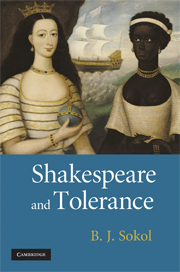Book contents
- Frontmatter
- Contents
- List of abbreviated titles
- Introduction
- 1 Shakespeare, jokes, humour, and tolerance
- 2 Shakespeare, gender, and tolerance
- 3 Shakespeare, tolerance, and nationality
- 4 Shakespeare, tolerance, and religion
- 5 ‘Race’, part one
- 6 ‘Race’, part two: Shakespeare and slavery
- 7 Afterword: tolerance as a species of love
- Notes
- Bibliography
- Index
Introduction
Published online by Cambridge University Press: 20 August 2009
- Frontmatter
- Contents
- List of abbreviated titles
- Introduction
- 1 Shakespeare, jokes, humour, and tolerance
- 2 Shakespeare, gender, and tolerance
- 3 Shakespeare, tolerance, and nationality
- 4 Shakespeare, tolerance, and religion
- 5 ‘Race’, part one
- 6 ‘Race’, part two: Shakespeare and slavery
- 7 Afterword: tolerance as a species of love
- Notes
- Bibliography
- Index
Summary
A great deal has been written of late about early modern patriarchy, racism, bigotry, exploitation, hegemonic relations, oppression of ‘outsiders’, and ‘containment’ of human difference; it has often been claimed that these intolerant traits and practices are reflected from Shakespeare's culture into his work. A counterpoise seems in order in the form of an attempt to explore Shakespeare and tolerance.
Although there has been much research and debate about early modern tolerance, especially religious tolerance, little of this has been applied to Shakespeare studies, or literary studies generally. Indeed, I feel that a subject area of ‘literature and tolerance studies’ is needed, and hope my efforts may contribute somewhat towards that.
This Introduction discusses what ‘tolerance’ might mean in relation to a study of Shakespeare. It is a tricky question, although only a subdivision of the much-discussed issue of what tolerance means in general.
Some of the problems can be identified by posing a simple riddle: why is it that, in popular parlance, ‘to be tolerant’ and ‘to tolerate some particular X’ may seem in some sense diametrically opposed? For instance, to say that ‘I tolerate gays’ may be seen as offensive, because acceptance on such terms may seem derogatory and, in its condescension, not in accordance with ‘being tolerant’. Allied with this paradox is the political/ethical question: should a programme to advance the social good of ‘toleration’ promote ‘tolerant persons’, or alternatively merely induce a public to ‘tolerate X, Y or Z’?
- Type
- Chapter
- Information
- Shakespeare and Tolerance , pp. x - xviPublisher: Cambridge University PressPrint publication year: 2008

